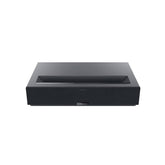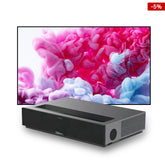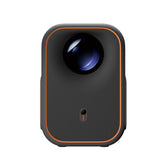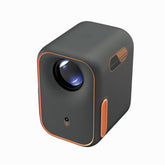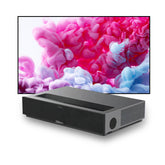Exploring Projection Technology: Laser vs LED vs Lamp Projectors
In the ever-evolving landscape of digital projection technology, laser projectors are gradually emerging as the industry's focus. However, traditional LED and lamp projectors still maintain a significant presence in the market. This article will compare these three projection technologies, highlighting the advantages of laser projectors.
1. Brightness and Clarity
Laser Projectors: Laser projectors typically offer outstanding brightness and clarity. Their laser light source produces more accurate and vibrant colors, along with uniform illumination, ensuring sharpness and brightness in various environments.
LED Projectors: LED projectors perform well in brightness and clarity but may not surpass laser projectors. They can still meet most scene requirements with good color reproduction and contrast.
Lamp Projectors: Lamp projectors usually exhibit lower brightness and clarity, especially after prolonged use when the light source gradually diminishes, leading to dimmer images and color distortion.
2. Lifespan and Reliability
Laser Projectors: Laser projectors boast long lifespans and high reliability. Laser devices experience minimal degradation over time, resulting in extended lifespans and more reliable performance.
LED Projectors: While LED projectors have longer lifespans than lamp projectors, LEDs may suffer from light source degradation and pixel distortion after prolonged usage, albeit to a lesser extent than traditional lamps.
Lamp Projectors: Lamp projectors typically have shorter lifespans, requiring frequent bulb replacements. They may also experience sudden bulb failures or ruptures during operation.
3. Energy Efficiency and Environmental Impact
Laser Projectors: Laser projectors are generally more energy-efficient than LED and lamp projectors, thanks to their lower power consumption and reduced need for frequent light source replacements, thereby minimizing energy consumption and electronic waste generation.
LED Projectors: LED projectors exhibit higher energy efficiency compared to lamp projectors and do not contain hazardous substances like mercury, resulting in a smaller environmental footprint.
Lamp Projectors: Lamp projectors often consume more energy and may contain mercury and other hazardous materials in their bulbs, posing environmental pollution concerns post-usage.
4. Projection Distance and Angle
Laser Projectors: Laser projectors typically have a wider range of projection distances and broader projection angles. This means users can install the projection equipment in more flexible positions and achieve larger projection screen sizes without sacrificing image quality.
LED Projectors: LED projectors are usually limited in projection distance and angle, requiring more precise installation positions to achieve the best projection effects.
Lamp Projectors: Lamp projectors offer lower flexibility in projection distance and angle, often requiring stricter installation conditions to ensure optimal projection effects.
5. Response Speed and Image Stability
Laser Projectors: Laser projectors feature fast response speeds and stable image performance, suitable for high-speed dynamic scenes such as gaming and sports events, delivering clear and smooth images.
LED Projectors: LED projectors typically have fast response speeds, but may exhibit blurring or ghosting effects when handling high-speed dynamic images.
Lamp Projectors: Lamp projectors have slower response speeds compared to laser and LED projectors, potentially affecting the performance in high-speed dynamic scenes.
6. Color Performance and Color Accuracy
Laser Projectors: Laser projectors can present a wider color gamut and more accurate colors, maintaining the color fidelity and detail representation of the images.
LED Projectors: LED projectors offer good color performance, but may not achieve the color depth and accuracy of laser projectors.
Lamp Projectors: Lamp projectors exhibit relatively weaker color performance, with colors potentially deviating or distorting.
Laser projectors offer significant advantages in projection distance, projection angle, response speed, color performance, and more, providing users with a broader range of options and superior audiovisual experiences. Whether for home entertainment, commercial displays, or educational applications, choosing a laser projector will bring you excellent projection results and long-term investment returns.











